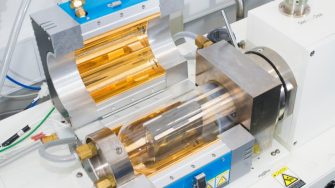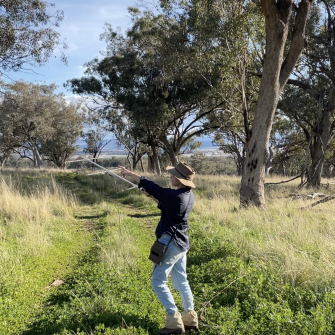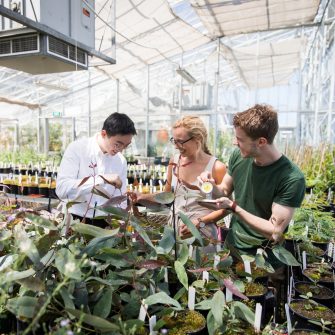Bachelor of Engineering (Honours) (Materials Science & Engineering) / Engineering Science
- Commencing Terms
- Term 1, 2 & 3
- Duration
- 5 Year(s)
- Delivery Mode
- Face-to-face (includes blended)
- Campus
-
Kensington
- Codes
- UAC code 429620
- Program code 3132
- CRICOS code 089471M
-
ATAR/2025 lowest selection rank
- 92.0 View all admission criteria
-
2026 Indicative first year full fee
- $8,500*
-
2026 Indicative full fee to complete degree
- $47,500*
-
2026 Indicative first year full fee
- $62,500*
-
2026 Indicative full fee to complete degree
- $344,000*

Application closures for 2026
International applications for all undergraduate programs, as well as postgraduate programs offered by the faculties of Arts, Design & Architecture, Engineering (excluding Master of Information Technology and associated programs) and Science are now closed to New Overseas Student Commencement (NOSC) for 2026 intakes.
Postgraduate programs offered by the Business School and the faculties of Law & Justice and Medicine & Health remain open. Master of Information Technology (and associated programs) also remain open.
- Overview
- Entry requirements
- What will I study?
- Future careers
- How to apply
- Fees & Scholarships
Overview
This double degree program allows you to earn two degrees after five years of successful study: a Bachelor of Engineering (Honours) in Materials Science and Engineering and a Bachelor of Engineering Science in Chemical Engineering. The program is ideal if you wish to pursue a career in the complementary disciplines of materials science and engineering and chemical engineering. Where materials engineers concern themselves mainly with the underlying science of high-performance materials such as metals, ceramics, polymers and composites, chemical engineers focus on turning raw materials into useful, marketable products from fertilisers, drugs, and plastics, to paper, paint, and food. By studying both degrees, you will learn foundational theory and practical skills that will put you at the forefront of development and innovation.
Why study at UNSW?
A double degree in materials science and engineering and chemical engineering offers a unique blend of knowledge and skills, expanding career options, enhancing employability, and equipping you to address complex technological and societal challenges. For instance, acquiring expertise in two distinct but complementary fields can enhance problem-solving abilities and make you versatile in tackling interdisciplinary challenges. UNSW is ranked #1 in Australia #27 globally for materials science ranked #1 in Australia and #25 globally for Engineering and Technology (QS World University Rankings by Subject, 2025). This double degree opens doors to diverse industries such as manufacturing, energy, biomedical engineering, chemical processing, materials development, environmental engineering, and research and development. Finally, it helps develop a broad perspective, interdisciplinary thinking, and effective communication with professionals from various backgrounds.
Want to see more from UNSW Science?
Entry requirements
-
- The 2025 Lowest Selection Rank (LSR) is the adjusted rank (ATAR plus adjustment factors) you would have needed to gain entry to this degree in 2025.
- The 2025 A levels score is based on four Advanced Level (A2) subjects. Entry scores are calculated from the best three or four A2 subjects (excluding repeated subjects) using the following values: A*=6, A=5, B=4, C=3, D=2, E=1. At most one Applied A Level subject may be included in the best four subjects used to calculate the aggregate.
- The 2025 IB Diploma is an indication of the IB you would have needed to gain entry to this degree in 2025. It is to be used as a guide only.
- The 2025 Lowest ATAR is the lowest ATAR (before adjustment factors were applied) to which an offer was made. Where <5 is listed, this indicates that less than 5 ATAR-based offers were made and so the score has not been published. N/A indicates no offers were made on the basis of ATAR.
*The Lowest ATAR to which an offer was made, for this program, is based on a UNSW Gateway Early Conditional Offer.
-
At UNSW, we are committed to ensuring prospective students have all the information they need in order to make informed decisions about their study options.
To assist you in gaining a better understanding of how Admissions works at UNSW, we have provided you with a summary of ATAR offers and the student profile.
We hope this information will help you identify the degree that is right for you.
Assumed knowledge
Mathematics Extension 1, Physics. Depending on your chosen Engineering Science specialisation assumed knowledge may also include Chemistry.
Adjustment Factors
We offer a range of adjustment factor schemes that reward students for academic performance and extra-curricular achievements. These schemes also take into account a range of personal and educational disadvantages that may have affected your studies.
HSC Plus
This scheme rewards students who perform well in Year 12 subjects that are relevant to their preferred UNSW degree. You may be awarded up to five points.
Elite Athletes, Performers and Leaders (EAPL)
This program recognises achievements in the areas of sport, academia, leadership and music at an elite level. You may be eligible for up to five points.
Educational Access Scheme (EAS)
Factors such as illness, financial hardship, language difficulties or attending a particular school can mean you don't always get the best possible marks in Years 11 and 12. If one of these situations applies to you, submit an application for the Educational Access Scheme (EAS) via UAC. Eligible students can receive between 1 and 10 points towards their chosen UNSW degree.
Admission pathways
Your ATAR is not the only measure of your potential to succeed, which is why we offer a range of pathways into university. Explore your options below and get in touch with our Future Student Advisers to discuss your path to UNSW.
Gateway Admission Pathway
This scheme is open to students who attend Gateway schools, live in a low-socioeconomic area based on IEO index of SEIFA criteria, are Aboriginal and/or Torres Strait Islander, or hold an eligible humanitarian or protection visa. This pathway provides early offers and early conditional offers with a reduced ATAR entry requirement for your preferred UNSW degree.
Entry programs for Australian Aboriginal and Torres Strait Islander people
We offer entry programs for Indigenous Australians, including the Indigenous Preparatory Programs and the Indigenous Admission Scheme (IAS). The entry pathway program you apply for will depend on the degree you want to study.
English language requirements
You may be asked to provide evidence of your English proficiency to study at UNSW depending on your educational background and citizenship. English language skills are vitally important for coping with lectures, tutorials, assignments and examinations - this is why UNSW requires a minimum English language competency for enrolment.
If you’re completing an Australian Year 12 qualification (e.g. NSW HSC or equivalent), you do not need to provide anything extra to prove your proficiency. Your qualification will be used as evidence of your English proficiency.
If you do need to provide evidence of your English proficiency, this will be indicated in your application. You can prove this by providing evidence that you meet one or more of the following criteria:
- English language tests and university English courses
- Prior study in the medium of English
- Other qualifications
If you need to improve your English skills before you start your degree, UNSW College’s Academic English Programs are for you. The programs are suitable for various English levels and help you prepare for university studies and life in Australia.
For more details, visit the English Language Requirements page.
International direct entry
Information for applicants with CBSE, HKDSE or Singapore A Levels Qualification
Calculating your CBSE Score:
Awarded by CBSE, average percentage marks across English or Hindi, and your best four remaining subjects. Where marks are given as a range, the mid-point for that range is used e.g. 75 to 80 = 77.5.
Calculating your HKDSE Score:
Entry requirements are based on the aggregate of the best 5 achieved category A subjects (category B and C subjects are not considered).
For subjects other than Citizenship and Social Development: level 5**=7 points, level 5*=6 points, level 5=5 points, level 4=4 points, level 3=3 points, level 2=2 points, level 1=1 point, Level U=0 point.
For subject Citizenship and Social Development: Attained=2 points, Unattained=0 point. Citizenship and Social Development will only be counted towards the aggregate if the 2 points awarded for Attained ranks among the student’s best five scoring subjects.
If Mathematics Compulsory Part and Extended Part (Module 1 or 2) are both presented, both scores can be counted.
Calculating your Singapore A Levels:
Due to significant changes to the GCE A-Level Curriculum and University Admissions Score (UAS) calculation effective 2026, UNSW assessment is currently under review.
Note: Entry requirements published on this page are correct as of the day of publication and may change without notice.
We do not accept secondary qualifications from this country. We may accept tertiary study results, please contact us for more information.
Please contact us for direct entry requirements.
Admission pathways
If you do not meet the requirements for direct entry into your chosen degree, you may be eligible for a pathway program with UNSW College. UNSW College provides alternative entry options using university-approved content so that you can start your UNSW journey with confidence.
English language requirements
You may be asked to provide evidence of your English proficiency to study at UNSW depending on whether you are from an English-speaking background or non-English speaking background. English language skills are vitally important for coping with lectures, tutorials, assignments and examinations - this is why UNSW requires a minimum English language competency for enrolment.
If English is not your first language, you’ll need to provide proof of your English proficiency before you can be given an offer to study at UNSW. You can do this by providing evidence that you meet one or more of the following criteria:
- English language tests and university English courses
- Prior study in the medium of English
- Other qualifications
If you need to improve your English skills before you start your degree, UNSW College’s Academic English Programs are for you. The programs are suitable for various English levels and help you prepare for university studies and life in Australia.
For more details, visit the English Language Requirements page.
Check the specific English language requirements for this program
What will I study?
UNSW is introducing a new academic calendar from 2028.
We are moving to a new flex-semester calendar. What does this mean for your studies?
In this double degree, you'll complete two degrees, a Bachelor of Engineering (Honours) and a Bachelor of Engineering Science in Chemical Engineering. You'll develop skills and knowledge in two complementary areas. Gain technical knowledge in these related disciplines while learning the skills and attributes required to practice as a professional engineer. You'll develop an awareness of economic, environmental, and social issues.
Bachelor of Engineering (Honours) in Materials Science and Engineering allows you to select two societal materials electives, two general electives from outside the discipline, and two free electives from any discipline.
The Bachelor of Engineering (Honours) in Materials Science and Engineering includes 60 days of approved Industrial Training.
The Bachelor of Engineering Science includes study in a Chemical Engineering discipline, as well as foundational knowledge in the theories and sciences that are the basis for engineering. You'll learn the technical skills to analyse and apply your knowledge to solve engineering problems.
Study areas
Full program structure
Future careers
- Chemical Process Engineer: designs, optimises, and manages the production processes in industries such as chemicals, petrochemicals, pharmaceuticals, or materials manufacturing.
- Materials Engineer: designs and selects materials for specific applications, such as aerospace, energy, electronics, or biomedical devices.
- Research Scientist: conducts experiments, analyses data, and contributes to the development of new materials, processes, or technologies.
- Environmental Engineer: develops sustainable solutions and mitigating the environmental impact of industrial processes, including pollution control, waste management, renewable energy, or sustainable materials.
- Product Development Manager: designs, tests, and commercialises new products, ranging from consumer goods to industrial equipment.
- Quality Control Manager: ensures that products and processes meet industry standards and specifications, developing and implementing quality control protocols.
- Energy Engineer: develops sustainable and efficient energy solutions, such as designing and manufacturing solar panels, batteries, fuel cells, or energy storage devices.
Accreditation
This double degree is accredited by Engineers Australia, the largest professional body for engineers in the country. By becoming a member of Engineers Australia, you will have access to a network of over 100,000 professionals and enjoy the benefits of being connected to the biggest advocate for your future profession.
How to apply
Applications for undergraduate study from domestic students (Australian citizens, Australian permanent residents, Australian permanent humanitarian visa holders and New Zealand citizens) are processed by the Universities Admissions Centre (UAC).
Visit the Apply section of the UAC website and you can nominate up to five degrees in order of preference, with the first being your most desired degree and university.
On-time applications for admission usually close at the end of September each year for Term 1 admission. Late applications can be submitted, but a late fee will apply. For study starting in Term 1, the majority of offers are made in December and January. Visit the UAC website for key dates for admission outside of Term 1.
Ready to start your application?
For most international students, applications are submitted via our Apply Online service. We encourage you to submit your completed application as early as possible to ensure it will be processed in time for your preferred term.
Some high-demand programs with limited places, may have an earlier application deadline or may have an earlier commencement date. For details, visit the international admissions information page.
*If you are an international student studying an Australian qualification, go to the Universities Admission Centre (UAC) for application and UAC key dates. Note: If you are under 18 years of age, you need to make special arrangements. For details, visit the under 18 international students page.
Ready to start your application?
Fees & Scholarships
Commonwealth Supported Place: Student Contribution Band 2
*The student contribution for a Commonwealth Supported Place is an indication only of the amount payable in Year 1 based on a standard full-time load of 48 credit points (1.0 EFTSL). The actual student contribution you will be liable for depends on your individual program of study and the calendar year in which you enrol. Actual fees are calculated upon enrolment. Student contribution amounts are subject to annual review by the university and may increase each year during your studies (subject to caps determined by the Australian Government), effective at the start of each calendar year.
The indicative fees listed here are based on an estimated average and are for tuition only - other fees and charges are not included.
*Fees are subject to annual review by the University and may increase annually, with the new fees effective from the start of each calendar year. The indicative fees listed here are based on an estimated average and are for tuition only, other fees and charges are not included. The amount you pay will vary depending on the calendar year to enrol, the courses you select and whether your study load is more or less than 1 Equivalent Full Time Student Load (8 courses per year).
Indicative fees are a guide for comparison only based on current conditions and available data. You should not rely on indicative fees. More information on fees can be found at the UNSW fees website.
Indicative fees to complete the program have been calculated based on a percentage increase for every year of the program. Fee increases are assessed annually and may exceed the indicative figures listed here.
Indicative fees to complete the program include tuition plus an estimate of study-related costs of approximately $1,000 per year. To find out more about other costs, visit UNSW International.
Scholarships
At UNSW, we award over $83 million in scholarships each year. We pride ourselves on rewarding excellence and making university accessible to students from all walks of life. Whether you’re a domestic or international student, our range of scholarships, prizes and awards can support your journey.
Progress starts here – at a world-leading university

Top 20 Worldwide
UNSW is ranked #20 university in the world
QS World University Rankings, 2024–2026

Most Employable Graduates
Winner of the AFR Most Employable University Award seven years in a row
AFR Top100 Future Leaders Awards, 2020–2026

Australia's #1 for Innovation
Highest number of startups and spinouts from university-developed tech
SCOPR report, 2024






